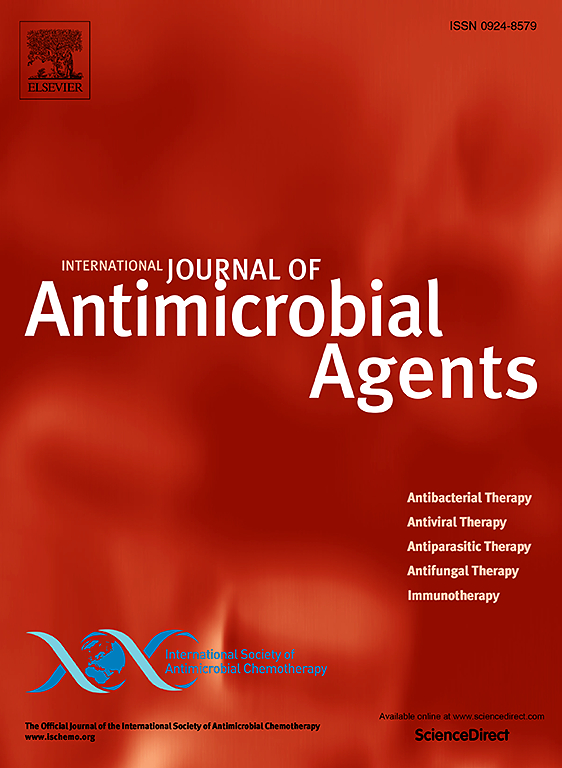噬菌体治疗耐多药鲍曼不动杆菌疗效的贝叶斯评价
IF 4.6
2区 医学
Q1 INFECTIOUS DISEASES
International Journal of Antimicrobial Agents
Pub Date : 2025-04-09
DOI:10.1016/j.ijantimicag.2025.107508
引用次数: 0
摘要
目的应用贝叶斯统计模型,研究噬菌体治疗鲍曼不动杆菌(Acinetobacter baumannii)的疗效。该研究的重点是测量经噬菌体治疗的临床前动物模型的生存结果,强调贝叶斯方法在解决生物学数据中存在的不确定性方面的前景。方法我们进行了一项系统综述,重点是在动物模型中识别有关噬菌体治疗的相关研究。采用贝叶斯探索性数据分析方法,对啮齿类动物、黄颡鱼和斑马鱼的存活率进行了评估。在敏感性分析中使用各种先验分布来评估结果的可靠性。结果研究表明,在所有实验模型中,接受噬菌体治疗的组的存活率都要高得多。在未治疗组中,啮齿动物的存活率从20%到40%不等,而治疗组的存活率则增加到60%到80%。mellonella和斑马鱼模型的存活率上升了。从未治疗组的30% - 50%到治疗组的70%-90%和70%-80%。分析证明了这些发现的可靠性,在不同的先前假设中显示出一致的生存优势。实际意义该结果支持噬菌体疗法作为治疗多种药物耐药感染的一种可能方法的临床发展。贝叶斯方法的使用为评估治疗效果提供了坚实的基础,特别是在传统统计方法可能不足的情况下。在这项研究中,贝叶斯方法以一种新的方式被用于研究噬菌体治疗的效果。这表明他们可以处理临床前研究中的变化和不确定性。这项研究增加了越来越多的证据,强调噬菌体治疗是传统抗生素的可行替代方案。本文章由计算机程序翻译,如有差异,请以英文原文为准。

Bayesian evaluation of phage therapy efficacy against multidrug-resistant Acinetobacter baumannii
Purpose
The objective of this study is to examine the efficacy of bacteriophage therapy in combating Acinetobacter baumannii, a pathogen known for its multidrug resistance, through the application of Bayesian statistical models. The research focuses on measuring survival outcomes in preclinical animal models that have been treated with bacteriophages, highlighting the promise of Bayesian methods in tackling the uncertainties present in biological data.
Methodology
We carried out a systematic review, focusing on identifying pertinent studies regarding phage therapy in animal models. Bayesian exploratory data analysis was utilized to evaluate survival rates among three species: rodents, Galleria mellonella, and zebrafish. Various prior distributions were utilized in sensitivity analyses to assess the reliability of the results.
Results
The study showed that groups that were treated with phage therapy had much higher survival rates across all experimental models. In untreated groups, survival rates for rodents ranged from 20% to 40%, while treated groups saw an increase to between 60% and 80%. Survival rates went up in the G. mellonella and zebrafish models. They went from 30% to 50% in the untreated groups to 70%–90% and 70%–80%, respectively, in the treated groups. The analysis demonstrated the reliability of these findings, showing consistent survival advantages across different prior assumptions.
Practical implications
The results support the clinical development of phage therapy as a possible way to treat infections that are resistant to multiple drugs. The use of Bayesian methods provides a strong foundation for assessing therapeutic effectiveness, especially in situations where conventional statistical approaches might fall short.
Originality/value
In this study, Bayesian methods are used in a new way to figure out how well phage therapy works. This shows that they can handle variation and uncertainty in preclinical studies. This research adds to the increasing body of evidence that highlights phage therapy as a viable alternative to traditional antibiotics.
求助全文
通过发布文献求助,成功后即可免费获取论文全文。
去求助
来源期刊
CiteScore
21.60
自引率
0.90%
发文量
176
审稿时长
36 days
期刊介绍:
The International Journal of Antimicrobial Agents is a peer-reviewed publication offering comprehensive and current reference information on the physical, pharmacological, in vitro, and clinical properties of individual antimicrobial agents, covering antiviral, antiparasitic, antibacterial, and antifungal agents. The journal not only communicates new trends and developments through authoritative review articles but also addresses the critical issue of antimicrobial resistance, both in hospital and community settings. Published content includes solicited reviews by leading experts and high-quality original research papers in the specified fields.

 求助内容:
求助内容: 应助结果提醒方式:
应助结果提醒方式:


